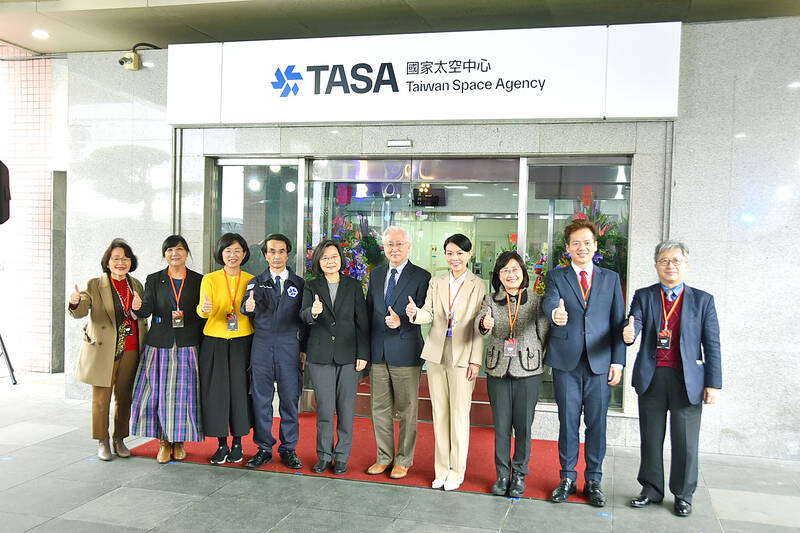The national space agency yesterday officially changed its name to the Taiwan Space Agency (TASA), after it was earlier this week upgraded and placed under the purview of the Cabinet-level National Science and Technology Council.
The Hsinchu City-based entity, previously called the National Space Organization, was renamed to include “Taiwan,” as this would improve readability and international recognition, the council said.
“The reorganization is a very important milestone for the country’s space development” as domestic technology would now receive more international recognition, President Tsai Ing-wen (蔡英文) said at the rebranding ceremony.

Photo: Wu Po-hsuan, Taipei Times
She said after the reorganization, TASA would be tasked with additional assignments, such as working with the Ministry of Economic Affairs to upgrade the nation’s space industry and working with the Ministry of Education to train space industry talent.
To seize international business opportunities, “we have been preparing to install ourselves in space. Taiwan’s 30 years of development of space technology and its accumulated results in the research and development of satellites have given it an excellent track record,” Tsai said.
TASA Director-General Wu Jong-shinn (吳宗信) told reporters that the reorganization would give the agency access to additional resources.
Taiwan’s advantage in space development is that it has the necessary fundamentals and has reached the stage at which is develops its own components, Wu said.
TASA, which currently employs about 200 people, is planning to recruit about 300 new staff over the next three years, Wu added.
“The restructuring also allows for a raise in salaries, which will be more attractive compared with the past,” he said.
The restructuring was implemented on Jan. 1 in accordance with the Act for the Establishment of the Taiwan Space Agency (國家太空中心設置條例), which was promulgated on May 4 last year.
The upgraded status aims to enhance national space technology research and development capabilities, implement national space strategies and plans, and promote the development of space activities and the space industry, the act says.
Originally established in 1991 as the National Space Program Office of the National Space Technology Long-Term Development Program, the entity became part of the National Applied Research Laboratories in 2003 and renamed the National Space Organization in 2005.
Since 1999, the agency has seen the launch of the Formosat-1, Formosat-2, Formosat-3, Formosat-5 and Formosat-7 satellites.
The Formosat-5 and Formosat-7 constellations are still in service, while Formosat-8, a constellation of six high-resolution optical remote sensing satellites, is to be launched next year and in 2025.
The TRITON (Wind-Hunter Satellite) is to be launched this year as part of an effort to research air-sea interaction and predict the intensity of typhoons, Wu said.
“Through a GPS receiver we can measure the height of the waves in the sea and calculate the speed of the wind, which is very important for our daily weather predictions,” Wu said.

The Ministry of Economic Affairs has fined Taobao NT$1.2 million (US$36,900) for advertisements that exceeded its approved business scope and ordered the Chinese e-commerce platform to make corrections in the first half of this year or its license would be revoked. Lawmakers have called for stricter supervision of Chinese e-commerce platforms and more stringent measures to prevent China from laundering its goods through Taiwan as US President Donald Trump’s administration cracks down on origin laundering. The legislature’s Finance Committee yesterday met to discuss policies to prevent China from dumping goods in Taiwan, inviting government agencies to report on the matter. Democratic Progressive Party

Taiwan and its Pacific ally Tuvalu on Tuesday signed two accords aimed at facilitating bilateral cooperation on labor affairs, according to Taiwan’s Ministry of Foreign Affairs (MOFA). The governments inked two agreements in Taipei, witnessed by Foreign Minister Lin Chia-lung (林佳龍) and visiting Deputy Tuvaluan Prime Minister Panapasi Nelesone, MOFA said in a news release. According to MOFA, the agreements will facilitate cooperation on labor issues and allow the two sides to mutually recognize seafarers’ certificates and related training. Taiwan would also continue to collaborate with Tuvalu across various fields to promote economic prosperity as well as the well-being of their

The Taipei District Prosecutors’ Office has continued its investigation into allegations of forged signatures in recall efforts today by searching the Chinese Nationalist Party’s (KMT) city chapter and questioning several personnel including the chapter director, according to media reports. Among those questioned and detained were KMT Taipei chapter director Huang Lu Chin-ju (黃呂錦茹), chapter secretary-general Chu Wen-ching (初文卿), chapter secretary Yao Fu-wen (姚富文) and first district committee executive director Tseng Fan-chuan (曾繁川). Prosecutors said they would not confirm reports about who had been summoned. The investigation centers on allegations that the ongoing recall campaigns targeting Democratic Progressive Party legislators Rosalia Wu (吳思瑤)

Several Chinese Nationalist Party (KMT) officials including Chairman Eric Chu (朱立倫) are to be summoned for questioning and then transferred to prosecutors for holding an illegal assembly in Taipei last night, the Taipei Police said today. Chu and two others hosted an illegal assembly and are to be requested to explain their actions, the Taipei City Police Department's Zhongzheng (中正) First Precinct said, referring to a protest held after Huang Lu Chin-ju (黃呂錦茹), KMT Taipei's chapter director, and several other KMT staffers were questioned for alleged signature forgery in recall petitions against Democratic Progressive Party (DPP) legislators. Taipei prosecutors had filed